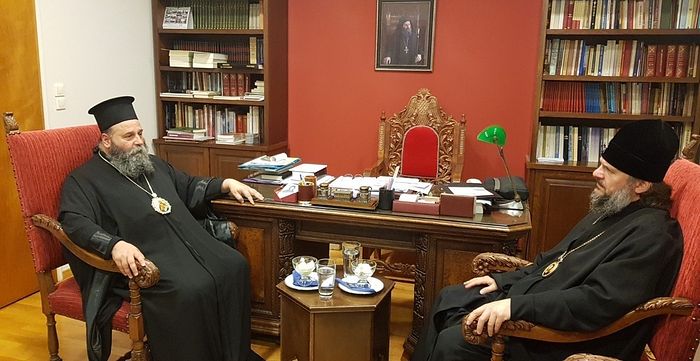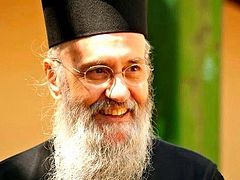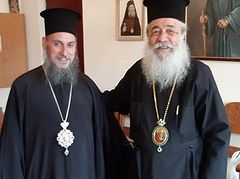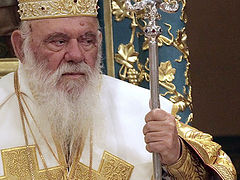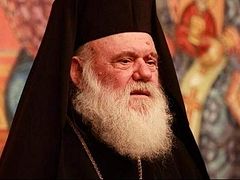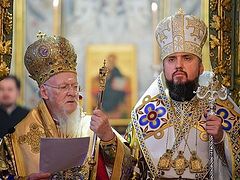Ioannina, Greece, September 18, 2019
A hierarch of the Patriarchate of Constantinople, in the New Lands of Greece, expressed his disappointment with the Russian Holy Synod’s decision to break communion with Constantinople last year in a recent meeting with a hierarch of the Russian Orthodox Church, also lamenting that Patriarch Bartholomew’s efforts at unity went unappreciated.
His Eminence Metropolitan Maximos of Ioannina received His Eminence Archbishop Ambrose of Verey on Monday, September 16, giving the brother hierarchs the opportunity to discuss a number of ecclesiastical and general issues, reports Romfea.
The Metropolis of Ioannina is among the New Land territories that are part of the Patriarchate of Constantinople but are administered on a daily basis as part of the Greek Orthodox Church. Abp. Ambrose is the newly-appointed abbot of Sretensky Monastery and rector of the Sretensky Theological Seminary in Moscow.
Of course, Ukrainian autocephaly was among the main issues discussed by the two hierarchs.
Met. Maximos made detailed reference to issues that have occasionally arisen but which have also evolved in recent decades in the Orthodox world. He also spoke of how politics have influenced ecclesiastical events in both the ancient and modern realities; of the economy used in the granting of autocephaly in the past 180 years, by way of political-secular intervention; and of the exercise of economy in receiving schismatic clergy with a view to the restoration of ecclesiastical unity and communion.
Several such cases were earlier discussed by His Beatitude Archbishop Anastasios of Albania in his letter to Patriarch Bartholomew of Constantinople.
In particular, the Greek hierarch referred to the efforts of Patriarch Bartholomew and his concessions in recent years, “in order to maintain unity and companionship with the Russian Church, which,” he believes, “were not only not appreciated, but the Ecumenical Patriarch reached the point of being abandoned by the Moscow Patriarchate before the Holy and Great Council of Crete, and found himself being accused, while everything had been agreed upon in the pre-trial procedures, and always with his sacrifices and concessions.”
The interpretation that the Moscow Patriarchate “abandoned” Pat. Bartholomew by not attending the Crete Council is particular to the Patriarchate of Constantinople. Recall that the Antiochian, Georgian, and Bulgarian Churches had already decided not to attend the council, and thus the Moscow Patriarchate called for a pre-conciliar session to address their concerns and to save the pan-Orthodox nature of the council. However, Pat. Bartholomew declined to take such a step.
Regarding what had previously been agreed upon, although the granting of autocephaly was not ultimately discussed at the Crete council, there were nonetheless pre-conciliar documents where the process for granting autocephaly was agreed upon by all the Local Churches, save the issue of how a tomos is to be signed (Metropolitan Hilarion of Volokolamsk of the Moscow Patriarchate resisted Constantinople’s desire to sign all tomoses in a privileged position. 8 Local Churches sided with Met. Hilarion, while 6 sided with the Constantinople). However, Pat. Bartholomew openly acknowledged to the Romanian Holy Synod that he will not abide by the agreed-upon procedure.
For his part, Abp. Ambrose referred to the strong reactions of the Russian people regarding issues related to relations with heterodox confessions. In response, Met. Maximos recalled the Havana Document signed by His Holiness Patriarch Kirill and Pope Francis in February 2016, which included statements that “provoke the Orthodox sentiment.”
In particular, the document stated that “Orthodox and Catholics are united not only by the shared Tradition of the Church of the first millennium, but also by the mission to preach the Gospel of Christ in the world today. This mission entails mutual respect for members of the Christian communities and excludes any form of proselytism. We are not competitors but brothers.”
Indeed, the Havana Document itself provoked strong reactions from the faithful of the Russian Church. OrthoChristian offered several critiques of the Havana Document a few days after its signing. See here and here.
The Greek hierarch also begged Met. Ambrose to convey his anguish and disagreement with the Russian Synod’s decision to break communion with the Patriarchate of Constantinople after it unilaterally received two groups of uncanonical Ukrainian schismatics and declared its intent to create an autocephalous church in Ukraine, on the territory of the canonical Ukrainian Church under the Moscow Patriarchate.
He called on the Russian Church to restrain itself in order to maintain Orthodox unity.
“No one wants a schism, and we are glad that the Ecumenical Patriarchate did not impose the same measures regarding Communion as did the Russian Church,” Met. Maximos told Abp. Ambrose.
The point is often made that the break in communion is one-sided, that the Patriarchate of Constantinople did not reciprocate the Russian Church’s decision. However, this ignores the sad fact that the Russian Synod’s decision came only in response to the actions of Constantinople in Ukraine. From the point of view that Constantinople unilaterally replaced the canonical Ukrainian Church with a church made up of schismatics, the Russian Synod’s decision is quite understandable.
Met. Maximos further expressed his hope that the split will be overcome by patience, in a spirit of respect and economy for millions of people who had previously been cut off from the Church.
Nearly every Local Church, including the Russian Church, has called for a pan-Orthodox council to be called precisely to address and overcome the current problem in the Church, but Pat. Bartholomew has thus far refused to call a council, arguing that such a gathering “would be useless inasmuch as it would only lead to agreement that the participants are in disagreement with each other.”
In a letter to His Beatitude Archbishop Chrysostomos of Cyprus in June, Pat. Bartholomew also wrote that pan-Orthodox unity is falsely so called.
The hierarchs ended by exchanging heartfelt wishes, gifts, and invitations to visit Russia and Greece again in the future.

